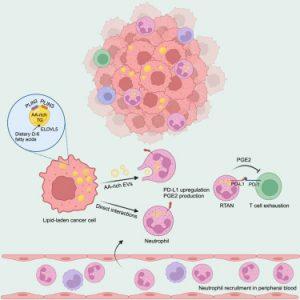A new study has uncovered how triple negative breast cancer (TNBC) can evade therapy by manipulating fat metabolism—not only within tumour cells but also in nearby immune cells (Figure 1). They found that when TNBC tumours survive initial chemotherapy and immunotherapy, they accumulate lipid droplets rich in omega-6 fatty acids. These lipids are not just fuel—they’re messengers, capable of turning immune cells from defenders into accomplices.
The research team used mouse models of TNBC to examine how tumours respond to standard therapies. They discovered that TNBC cells surviving treatment accumulate lipid droplets, and surprisingly, nearby neutrophils also take up these fats, dramatically changing their behaviour. Instead of attacking the tumour, these lipid-loaded neutrophils began supporting tumour growth and suppressing the immune response.
Critically, the researchers found that blocking lipid droplet formation—either pharmacologically or by reducing dietary omega-6 fatty acids—resensitized the tumours to chemotherapy and immunotherapy. The tumour microenvironment also became less immunosuppressive, allowing immune cells to re-engage.
This study provides the first direct evidence that lipid exchange between tumor and immune cells can be weaponized by the cancer to promote treatment resistance. It also identifies a modifiable lifestyle factor—dietary omega-6 intake—that may influence treatment outcomes.
Key Takeaways:
- TNBC tumors that survive therapy accumulate lipid droplets rich in omega-6 fatty acids.
- These lipids are transferred to neutrophils, reprogramming them to support tumor growth and suppress the immune response.
- Blocking lipid droplet formation or reducing dietary omega-6 intake resensitizes tumors to chemotherapy and immunotherapy.
- The findings may guide future metabolic therapies, dietary guidelines, and new drug targets to combat treatment-resistant TNBC.
This research represents a major step forward in understanding the metabolic interplay between cancer and the immune system—and offers real-world strategies to help shift the balance in favour of patients.
Journal article: Yu, L., et al, 2025. Tumor-derived arachidonic acid reprograms neutrophils to promote immune suppression and therapy resistance in triple-negative breast cancer, Immunity.
Summary by Stefan Botha











